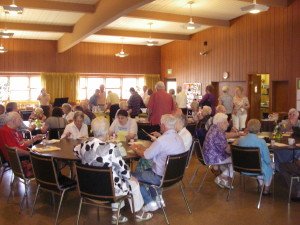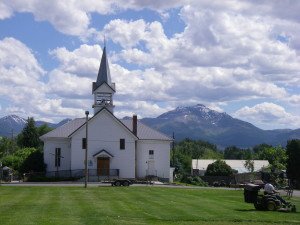What Do You Really Feel?
Between Two Worlds Day 34 (of 40)"I want to know what you have to say," writes Jen who reports that she goes to church. I believe that she is a member of the church where I am currently the interim pastor. Her comment gives me an opportunity to reflect on this "Between Two Worlds" theme. She is clearly responding to my post where I said that I feel that my voice over the years has become more constrained in the pulpit. I can clearly point to the change. Over the years I have felt this subtle shift where the sign of good sermons was not theological integrity, but whether there were "more butts in the pews" as a former elder used to put it (or fewer people were exiting the pews!). Based on that reasoning it appears that the quality of preachers has fallen--vast percentages of churches are in decline which can only mean one thing, right?! Seminaries just don't put out good preachers anymore!Jen also added, "I would love for you to preach a few sermons on how you really feel and not what you think the congregation would be comfortable with..." And this is where it is really important for me to make the distinction between feeling constrained and preaching "how I really feel." Because the fact of the matter I do preach what I really feel each Sunday.
Her comment gives me an opportunity to reflect on this "Between Two Worlds" theme. She is clearly responding to my post where I said that I feel that my voice over the years has become more constrained in the pulpit. I can clearly point to the change. Over the years I have felt this subtle shift where the sign of good sermons was not theological integrity, but whether there were "more butts in the pews" as a former elder used to put it (or fewer people were exiting the pews!). Based on that reasoning it appears that the quality of preachers has fallen--vast percentages of churches are in decline which can only mean one thing, right?! Seminaries just don't put out good preachers anymore!Jen also added, "I would love for you to preach a few sermons on how you really feel and not what you think the congregation would be comfortable with..." And this is where it is really important for me to make the distinction between feeling constrained and preaching "how I really feel." Because the fact of the matter I do preach what I really feel each Sunday. All preaching is done in the context of a relationship. It is contextual. It is like the difference between talking about sex with your teenager and talking about sex with your best friend. They are two completely different conversations. Your teenager doesn't need to know the juicy details that you share over lunch and drinks with your best friend. The teenager has one set of questions that has to do with boundaries, safety, health, consequences, etc. Your friend is wanting to share the intimacy and trust that goes into a best friend relationship. Same topic; two very different conversations.One of the things that I have been clear about in my relationship with my current congregation (of which Jen is a part, I believe) is that I am speaking to two very different communities. My preaching is to a congregation in a specific part of Oregon, in a very specific time of transition, with a very specific set of questions and concerns, with a very specific age and theological demographic, and in a very specific evolving denomination called Presbyterian. My blog is to a community of people all across the nation who are exploring the next great emerging form of spirituality and religious community.
All preaching is done in the context of a relationship. It is contextual. It is like the difference between talking about sex with your teenager and talking about sex with your best friend. They are two completely different conversations. Your teenager doesn't need to know the juicy details that you share over lunch and drinks with your best friend. The teenager has one set of questions that has to do with boundaries, safety, health, consequences, etc. Your friend is wanting to share the intimacy and trust that goes into a best friend relationship. Same topic; two very different conversations.One of the things that I have been clear about in my relationship with my current congregation (of which Jen is a part, I believe) is that I am speaking to two very different communities. My preaching is to a congregation in a specific part of Oregon, in a very specific time of transition, with a very specific set of questions and concerns, with a very specific age and theological demographic, and in a very specific evolving denomination called Presbyterian. My blog is to a community of people all across the nation who are exploring the next great emerging form of spirituality and religious community. The two are asking very different questions. One wants to know how they are going to get new people, pay their bills and survive for another generation. The other is asking what the future looks like and how do we get there. One prefers to hold onto what they have; the other has or is ready to let go of what was in order to welcome what will be.Personally, I wished that the Church was making the latter question a higher priority. But that is not my call. As an interim pastor I am like the counselor who simply creates the safe space for a congregation to tell me what's important to them. My role is not to impose a future on them, but to gently invite them into the future of their choosing. The fact of the matter is thousands of churches are now finding themselves asking, "How are we going to survive?" rather than "What is our mission to the community and to the world?" Of course, I don't blame them. It's a little hard to think about serving the community when you are worried about keeping the doors open. Isn't this human nature? I would be hesitant to volunteer my time at a free meal program if I was hungry myself or couldn't afford the gas to get there. Nonetheless, I wished congregations were less worried about staying open and more focused on what God had in store for them next.
The two are asking very different questions. One wants to know how they are going to get new people, pay their bills and survive for another generation. The other is asking what the future looks like and how do we get there. One prefers to hold onto what they have; the other has or is ready to let go of what was in order to welcome what will be.Personally, I wished that the Church was making the latter question a higher priority. But that is not my call. As an interim pastor I am like the counselor who simply creates the safe space for a congregation to tell me what's important to them. My role is not to impose a future on them, but to gently invite them into the future of their choosing. The fact of the matter is thousands of churches are now finding themselves asking, "How are we going to survive?" rather than "What is our mission to the community and to the world?" Of course, I don't blame them. It's a little hard to think about serving the community when you are worried about keeping the doors open. Isn't this human nature? I would be hesitant to volunteer my time at a free meal program if I was hungry myself or couldn't afford the gas to get there. Nonetheless, I wished congregations were less worried about staying open and more focused on what God had in store for them next. To Jen I would reassure her that I am saying what I really feel from the pulpit on Sundays. My point is that my prophetic voice is expected from my readers, but can be a threat to my congregation. Preaching always occurs in the context of a relationship. If I don't take enough risks in my blog I lose my readers. And if I take too many risks in the church I lose my congregation.Two different communities. Two different conversations. Two different kinds of work. Both of which I love and both of which I believe exist under one Sacred Canopy.
To Jen I would reassure her that I am saying what I really feel from the pulpit on Sundays. My point is that my prophetic voice is expected from my readers, but can be a threat to my congregation. Preaching always occurs in the context of a relationship. If I don't take enough risks in my blog I lose my readers. And if I take too many risks in the church I lose my congregation.Two different communities. Two different conversations. Two different kinds of work. Both of which I love and both of which I believe exist under one Sacred Canopy.
